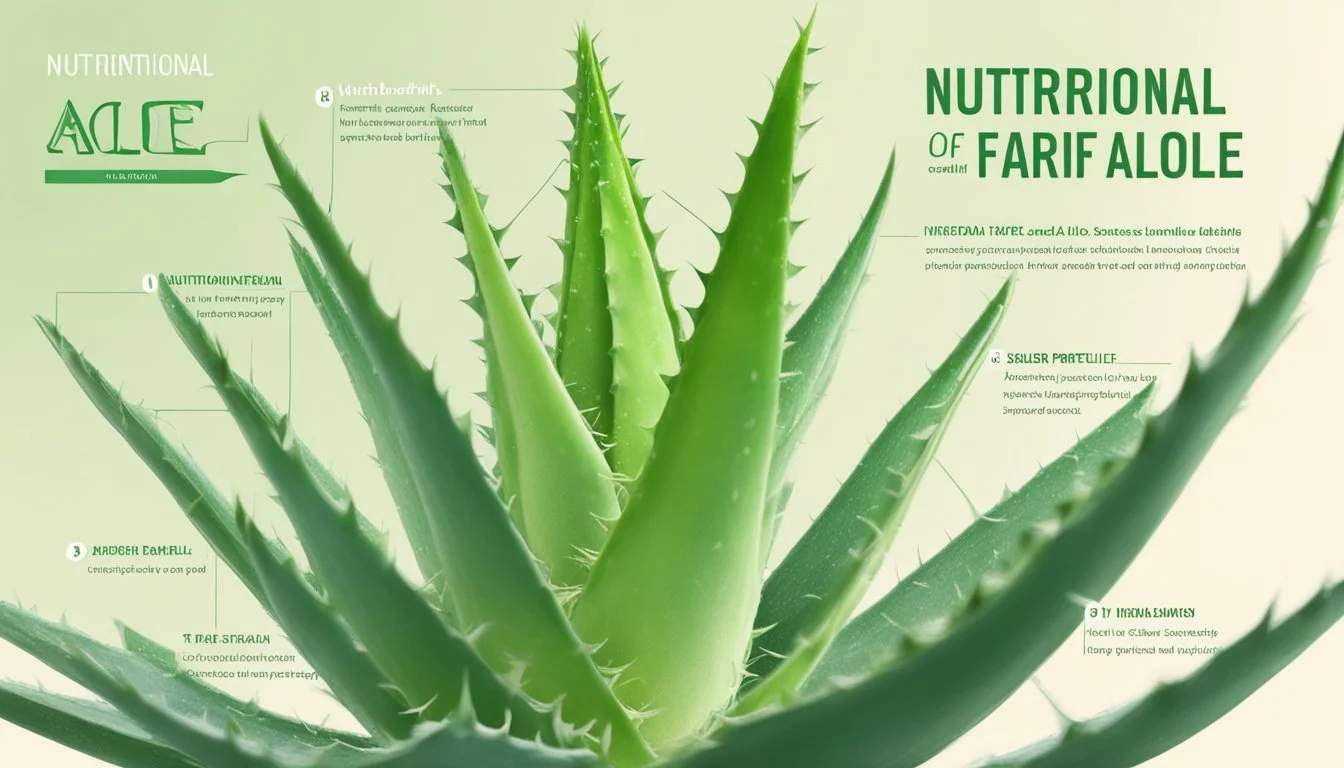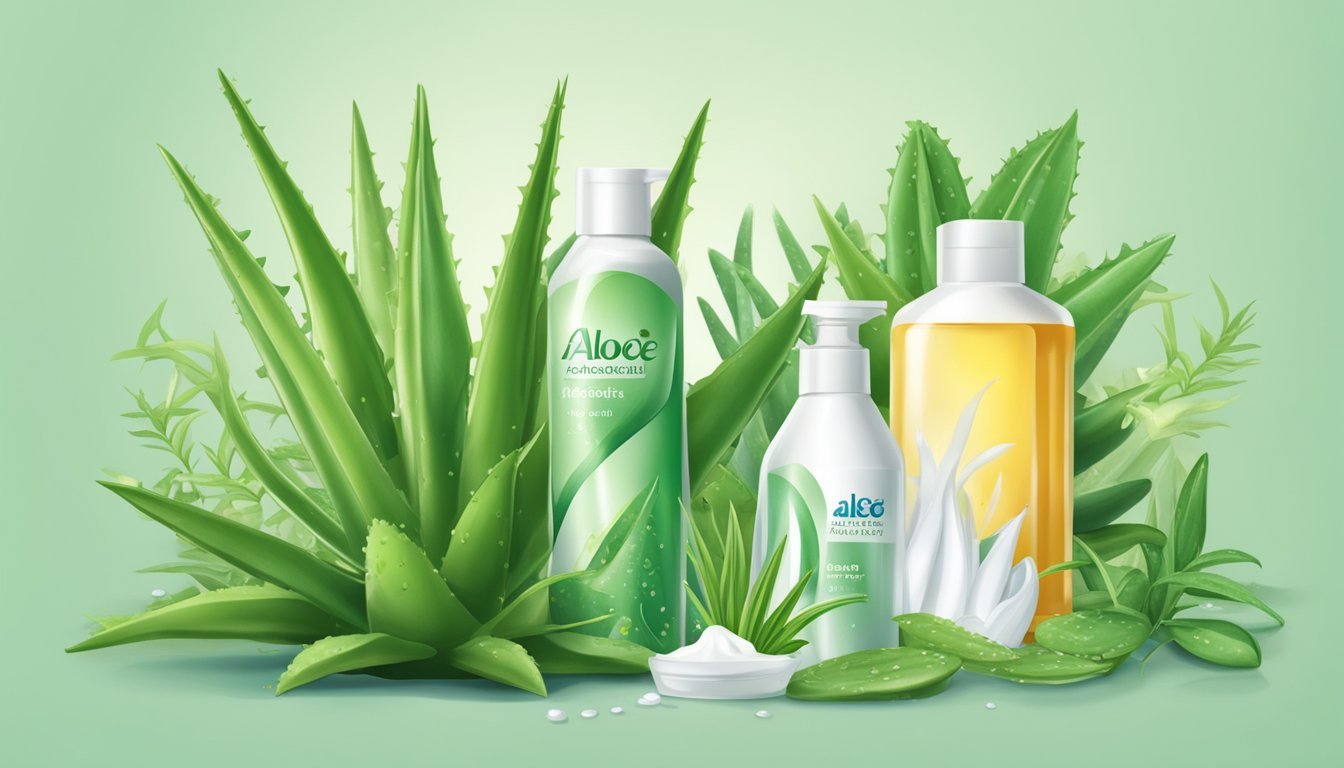Amazing Internal & External Health Benefits of Aloe
Unlocking Nature's Secret Healer
Aloe vera, a succulent plant known for its therapeutic properties, has been used for centuries to treat a wide range of health conditions. This ancient plant, sometimes referred to as the "plant of immortality," is rich in amino acids, vitamins, and minerals, making it a highly sought-after medicinal plant. Its use in healing both internal and external ailments, such as skin conditions, digestive issues, and maintaining healthy blood sugar levels, makes aloe vera an essential addition to any natural remedy stockpile.
Aloe vera gel, obtained from the fleshy leaves of the aloe plant, is known for its anti-inflammatory, antiseptic, and antioxidant properties. These properties make it an effective treatment for various skin conditions, including dry or irritated skin, insect bites, and burns, promoting the healing process and providing pain relief. Additionally, aloe vera has been shown to support digestive health, with research indicating its effectiveness in treating irritable bowel syndrome and gastroesophageal reflux disease.
However, it is essential to be aware of the potential adverse effects associated with the use of aloe products. While aloe gel is generally considered safe, aloe latex, which is extracted from the same leaf as the gel, has laxative properties and can cause abdominal cramps or dependency if used in excess. Therefore, to make the most of the benefits that this versatile medicinal plant has to offer, consult a healthcare provider before incorporating aloe vera preparations into your daily regimen.
History and Overview of Aloe
The Aloe Plant
The aloe plant, specifically Aloe vera, is a succulent plant species known for its diverse health benefits. This plant has been used for medicinal purposes in various cultures such as Greece, Egypt, India, Mexico, Japan, and China. Famous historical figures like Egyptian queens Nefertiti and Cleopatra incorporated aloe into their beauty regimens, while Alexander the Great and Christopher Columbus used it for treating soldiers' wounds.
Aloe vera plants grow in hot, dry climates, and the therapeutic properties of the plant can be attributed to the aloe gel found in its leaves. This gel contains essential amino acids, vitamins, minerals, and other compounds that provide various benefits for skin conditions, hair loss, blood sugar levels, and even digestive issues like irritable bowel syndrome (IBS).
Aloe Barbadensis: The Medicinal Species
Aloe Barbadensis is the species of aloe plant that is most commonly used for its medicinal qualities. The aloe vera gel and sap derived from this plant have notable anti-inflammatory, antimicrobial, and antiseptic properties, as well as antioxidant and protective effects.
Key Benefits & Uses of Aloe Vera:
Skin conditions: Aloe vera is known to soothe dry skin, reduce skin irritation, and help in the healing of insect bites, cuts, and burns.
Hair loss: Aloe's potential to promote healthy hair follicles may help prevent or reduce hair loss.
Blood sugar levels: Some studies suggest that aloe vera may have the ability to lower blood glucose levels and reduce the risk of heart disease in patients with type 2 diabetes.
Digestive health: Aloe vera has been used to alleviate symptoms of IBS and gastroesophageal reflux disease (GERD), as well as provide relief from abdominal cramps and other digestive problems.
Despite the numerous therapeutic properties of aloe vera, there are also potential adverse effects to consider. The aloe latex found in the plant may cause laxative effects, leading to abdominal discomfort and cramps in some individuals. It is important to consult with a healthcare provider before using aloe products for medicinal purposes or as part of a health regimen.
Internal Health Benefits of Aloe
Aloe vera, a succulent plant known for its therapeutic properties, has been utilized for medicinal purposes throughout history. This versatile plant offers various internal health benefits, which can be attributed to its rich nutritional profile, containing amino acids, vitamins, and minerals.
Digestive Benefits
Aloe vera possesses anti-inflammatory properties, which can help soothe the digestive tract and alleviate symptoms of irritable bowel syndrome (IBS). Consuming aloe juice or gel provides an effective, natural remedy for gastrointestinal issues such as constipation, as it has laxative properties. A study has also shown positive effects of aloe vera in the management of gastroesophageal reflux disease (GERD), further emphasizing its role in digestive health.
Blood Sugar Regulation
Aloe vera has demonstrated potential in regulating blood sugar levels, particularly for patients with type 2 diabetes. Research has indicated that aloe vera can help reduce blood glucose levels as well as lower the risk of heart disease in diabetic individuals. However, it is essential to discuss any changes in diabetes management with a healthcare provider before integrating aloe vera into your routine.
Immune System Enhancement
The antioxidant properties of aloe vera contribute to its ability to strengthen the immune system. Antioxidants help combat free radicals in the body, protecting against cell damage and reducing inflammation. Additionally, aloe vera contains antimicrobial properties, which can aid in preventing infections and maintaining overall health.
In the case of oral health, aloe vera mouthwash has been found to effectively reduce dental plaque due to its antimicrobial and anti-inflammatory activities. As such, incorporating aloe vera products into your daily routine has the potential to support both oral and general health.
While aloe vera has a host of health benefits, it is important to be cautious regarding its consumption and usage. The latex component of the aloe plant may cause abdominal cramps and diarrhoea due to its laxative effects. Therefore, it is recommended to consult a healthcare provider before incorporating aloe vera for medicinal purposes.
External Healing Properties
Skin Repair and Care
Aloe vera, a succulent plant known for its therapeutic properties, offers various benefits for skin conditions. The gel derived from the aloe plant contains amino acids, vitamins, and minerals that may help moisturize and soothe dry skin, alleviate irritation, and support the skin's natural healing process. Aloe vera gel's anti-inflammatory and antioxidant properties make it suitable for various skin types and conditions such as acne, psoriasis, and eczema.
When applied topically, aloe vera gel has been found to improve:
Dry skin: The hydrating nature of the gel helps retain moisture.
Skin irritation: The soothing effect of aloe can provide relief to irritated skin.
Acne: Aloe's antimicrobial and anti-inflammatory properties may help reduce acne and inflammation.
Wound Healing and Anti-Inflammatory Actions
The aloe vera plant has noteworthy wound healing and anti-inflammatory properties that make it valuable in the treatment of skin injuries and infections. Aloe vera gel can be applied to minor burns, sunburns, insect bites, and small wounds to promote healing and provide pain relief. Its antiseptic properties may help prevent infections while the gel's anti-inflammatory effects can reduce swelling and redness.
Some of the known healing and protective effects of aloe vera include:
Burns: The cooling effect of the gel can alleviate the pain from burns, including sunburns.
Wound healing: Through the activation of certain healing factors, aloe vera gel can accelerate the healing process of skin injuries.
Anti-inflammatory: Aloe vera's natural compounds may help reduce the inflammatory response in certain skin conditions.
While aloe vera offers a wide range of benefits for the skin and healing of external conditions, it's essential to note that individual reactions may vary, and consulting with a healthcare provider before using aloe vera products for specific health conditions is important.
Aloe in Dermatology and Skincare Products
Aloe vera, also known as the "plant of immortality," is a succulent plant with a long history of medicinal uses. It has been used for thousands of years to treat various health conditions and skin issues. This section will discuss the benefits of aloe vera in dermatology and skincare products, focusing on soothing gels and creams, and its hydration and anti-aging effects.
Soothing Gels and Creams
Aloe vera gel, derived from the aloe leaf, is widely used in many skincare products due to its therapeutic properties. It provides relief for various skin conditions, such as insect bites, sunburn, and skin irritation. The gel's anti-inflammatory and antiseptic properties help to soothe the affected areas and reduce redness and swelling.
Some of the key benefits of using aloe vera in dermatology and skincare products are:
Anti-inflammatory: Aloe vera contains compounds like flavones and phytosterols that reduce inflammation and calm itchy skin. These compounds also have a moisturizing effect on the skin, protecting against dehydration.
Wound healing: Aloe vera promotes skin repair and encourages new skin cell growth, thanks to the presence of polysaccharides in the gel.
Antioxidant: Aloe vera contains several active compounds that offer antioxidant protection, guarding the skin against free-radical damage and premature aging.
Hydration and Anti-Aging Effects
Another major benefit of aloe vera in skincare products is its hydrating and anti-aging effects. The plant's gel is rich in amino acids, vitamins, and minerals, which provide nourishment to the skin and help to retain moisture. Aloe vera can even be used on all skin types, including sensitive and dry skin, without causing any harmful effects.
The anti-aging effects of aloe vera are mainly due to its ability to stimulate collagen production in the skin, which helps to reduce the appearance of wrinkles and fine lines. Some of the hydration and anti-aging effects of aloe vera include:
Hydration: Aloe vera helps to maintain the skin's moisture levels. Its humectant properties attract and lock in moisture, ensuring proper hydration.
Collagen synthesis: Aloe vera's regenerative properties stimulate the production of collagen, which is essential for maintaining skin elasticity and minimizing signs of aging.
Dark spot reduction: Aloe vera aids in fading dark spots and hyperpigmentation caused by sun exposure, acne, or the natural aging process.
In conclusion, aloe vera has numerous benefits in dermatology and skincare, owing to its soothing, hydrating, and anti-aging properties. Its inclusion in skincare products, such as gels and creams, offers a natural approach to maintaining healthy, youthful skin.
Nutritional Profile of Aloe
Aloe Vera, a succulent plant known for its therapeutic properties, offers numerous internal and external health benefits. In this section, we will examine the nutritional profile of the Aloe Vera plant, focusing on its vitamins, amino acids, minerals, and nutrients.
Vitamins and Amino Acids
Aloe Vera boasts a rich content of vitamins and amino acids necessary for maintaining good health. It contains vitamins A, C, E, and B complex (B1, B2, B3, B6_), along with folic acid and choline. These vitamins play a crucial role in supporting our immune system, promoting healthy skin and hair, and assisting in overall cell function and repair. Additionally, Aloe Vera provides 20 essential amino acids, which are the building blocks for proteins that contribute to various bodily functions, including maintaining healthy muscle tissue and supporting the digestive system.
Minerals and Nutrients
The Aloe Vera plant is also an excellent source of vital minerals and nutrients. Some key minerals found in Aloe Vera include calcium, chromium, copper, magnesium, manganese, potassium, sodium, and zinc. These minerals help balance bodily fluids, reinforce the immune system, maintain proper nerve and muscle function, and support bone health.
In addition to vitamins and minerals, Aloe Vera contains enzymes that aid in breaking down sugars and fats in the digestive tract, enhancing overall digestion and addressing issues like irritable bowel syndrome. Also, Aloe Vera possesses plant sterols, which have anti-inflammatory properties that may provide natural relief for inflammatory conditions.
To conclude, the nutritional profile of Aloe Vera is incredibly diverse, featuring essential vitamins, amino acids, minerals, and nutrients. These components can contribute to the overall improvement of various health conditions and provide multiple benefits to those who incorporate Aloe Vera into their daily regimen.
Aloe for Oral Health
Aloe vera, a succulent plant, has been utilized for its medicinal properties for centuries. It is most commonly known for its therapeutic properties in treating skin conditions, but aloe vera also offers significant benefits for maintaining oral health.
Aloe as Mouthwash
Aloe vera contains antimicrobial and anti-inflammatory properties that make it an effective mouthwash alternative. The viscous gel obtained from aloe vera leaves can help combat harmful bacteria and alleviate inflammation commonly associated with gums and periodontal issues like gingivitis. Additionally, the presence of vitamins and minerals, such as folic acid and amino acids, further supports its use in maintaining oral hygiene.
To use aloe vera as a mouthwash, dilute the aloe vera gel or juice to an appropriate concentration and swish around your mouth for 30 seconds before spitting it out. Make sure to consult your healthcare provider before incorporating aloe vera mouthwash into your dental care routine.
Dental Plaque Reduction
Dental plaque can lead to various oral health problems like cavities and gum diseases. Aloe vera has exhibited antibacterial activity against various bacteria commonly present in the mouth, which contribute to the formation of plaque. By inhibiting the growth of these bacteria, aloe vera can effectively reduce dental plaque.
In a study comparing aloe vera mouthwash with chlorhexidine, a commonly used antiseptic in dental health, it was observed that aloe vera demonstrated comparable plaque-reducing effects. This makes aloe vera a potential candidate for inclusion in oral care products or as a natural alternative to conventional mouthwash.
In conclusion, aloe vera offers significant benefits for oral health, including its use as a mouthwash and for reducing dental plaque. Its antimicrobial and anti-inflammatory properties make it a valuable addition to one's oral care routine. However, always consult your healthcare provider before incorporating aloe vera products into your dental care regimen to ensure their safety and effectiveness.
Risks and Side Effects of Aloe
Aloe vera, a succulent plant known for its therapeutic properties, has a range of health benefits, including the ability to soothe skin conditions, promote hair growth, and support digestive health. However, it also has potential risks and side effects.
Potential Toxicity of Aloin
Aloe vera plants contain a compound called aloin, which primarily resides in the latex of the plant's leaves. Aloin is known for its laxative properties, but it may also have potential toxic effects. Although the risk is generally low when using aloe vera preparations, it's essential for users to be aware of the potential toxicity and follow recommended usage guidelines.
A study mentioned in the search results titled "Aloe vera: A review of toxicity and adverse clinical effects" shows that aloe vera is one of the most frequently used herbal remedies in the world, but its potential toxic effects should also be noted. Overconsumption of aloe latex or improper use of aloe vera products can lead to adverse effects such as abdominal cramps or excessive laxative effects.
Understanding Laxative Effects
The laxative effect of aloe vera is mainly linked to its latex component, which contains compounds like anthraquinones that contribute to its laxative properties. These properties arise when the aloe latex irritates the colon, stimulating bowel movements and providing relief from constipation. However, it's important to use caution when consuming aloe latex for this purpose since abuse of laxatives can lead to dependence and negative health consequences.
While the anti-inflammatory and antioxidant properties of aloe gel can help with a variety of health conditions, improper usage or excessive consumption of aloe latex might cause undesirable side effects. These may include:
Digestive issues: Consuming large quantities of aloe latex could worsen gastrointestinal problems and irritate the digestive tract.
Kidney problems: Excessive use of aloe laxatives may lead to kidney damage due to loss of potassium and electrolyte imbalances.
Contraindications: Aloe latex might interact with medications such as diuretics, corticosteroids, and heart rhythm medications, leading to adverse effects.
In conclusion, while aloe vera offers multiple benefits for skin, hair, and overall health, users must also be aware of the possible side effects associated with its latex and aloin components. As with any medicinal plant, make sure to consult with a healthcare provider before using aloe vera products to ensure safe and effective usage.
Aloe's Antioxidant and Antibacterial Properties
Aloe vera is a succulent plant that is well-known for its various medicinal and therapeutic properties. This plant has been used for centuries because of its wide range of health benefits. In this section, we will discuss the antioxidant and antibacterial properties of aloe vera.
Combating Free Radicals
Aloe vera contains powerful antioxidants such as vitamins A, C, and E, as well as amino acids and various enzymes. These antioxidants help combat free radicals in the body, which are responsible for cellular damage and can contribute to various health conditions such as aging, heart disease, and even cancer. By neutralizing these harmful molecules, the antioxidants in aloe vera help protect the body from oxidative stress and reduce the risk of chronic diseases.
Some potential benefits of aloe's antioxidant properties include:
Improved skin health: Aloe vera gel can help soothe dry skin, reduce irritation, and promote overall skin wellness.
Enhanced immune system: The antioxidants present in aloe vera can help strengthen the immune system, making it more effective against infections and diseases.
Delayed aging process: By reducing the effects of oxidative stress on the body, aloe vera may help slow down the aging process.
Inhibiting Bacterial Growth
Aloe vera also exhibits noteworthy antibacterial properties. The plant contains various active compounds, such as anthraquinones, which are known for their antiseptic and antimicrobial qualities. These substances can inhibit the growth of harmful bacteria, helping to prevent infections and promote overall health.
Some of the health benefits associated with aloe's antibacterial properties include:
Improved oral health: Studies have shown that aloe vera mouthwash can effectively combat bacteria that cause gum diseases and tooth decay.
Enhanced digestive health: Aloe vera juice may help alleviate symptoms of gastrointestinal issues like irritable bowel syndrome (IBS) and gastroesophageal reflux disease (GERD) by reducing inflammation in the digestive tract and inhibiting the growth of harmful bacteria.
Treating skin conditions and injuries: Aloe vera gel can be applied topically to help treat various skin issues, such as burns, insect bites, and minor cuts, due to its antimicrobial and anti-inflammatory properties.
It is essential to seek advice from a healthcare provider before using aloe vera products to ensure their safety and effectiveness for specific conditions. It is equally important to be aware of any potential adverse effects, such as abdominal cramps or allergic reactions, especially when ingesting aloe latex or using products containing high concentrations of aloe vera.
Aloe in Traditional and Alternative Medicine
Historical Uses of Aloe
The Aloe vera plant, a succulent species, has been utilized for its therapeutic properties in various civilizations throughout history. Known as the "plant of immortality" by ancient Egyptians, it was employed for diverse purposes ranging from soothing skin conditions to pain relief. In traditional Chinese medicine, the aloe plant was used to treat skin irritations, constipation, and fungal infections.
Rich in vitamins, minerals, and amino acids, aloe vera contains health-supporting compounds such as folic acid, fatty acids, and antioxidant properties, which contribute to its numerous benefits.
Contemporary Alternative Treatments
Skin conditions: Due to its anti-inflammatory and antiseptic properties, aloe vera gel is commonly applied topically to address dry skin, insect bites, and other skin irritations. This versatile gel not only soothes skin but also enhances the healing process for minor burns and wounds.
Hair loss: Aloe vera can be effective in promoting hair growth, as it revitalizes hair follicles and helps alleviate inflammation in the scalp. Application of aloe gel directly to the scalp has been reported to improve hair health and stimulate growth.
Digestive health: The consumption of aloe vera, usually in the form of aloe juice or aloe gel, is believed to support healthy digestion. Internal use of aloe vera has shown promise in managing symptoms of irritable bowel syndrome (IBS), gastroesophageal reflux disease (GERD), and other digestive complaints due to its soothing and anti-inflammatory effect on the digestive tract.
Blood sugar control and heart health: Aloe vera has garnered attention for its potential to regulate blood glucose levels and reduce the risk of heart disease. Some studies suggest that aloe vera can improve blood sugar management in patients with type 2 diabetes. However, more extensive research is needed to confirm these findings and understand its mechanism of action.
Oral health: Aloe vera has demonstrated its efficacy in promoting oral health by reducing dental plaque and combatting oral infections. Aloe vera mouthwash, toothpaste, and other oral care products are increasingly available for consumers seeking a natural alternative to traditional options.
Despite its many benefits, it is crucial to note that aloe vera can also have adverse effects, particularly with aloe latex – the yellow substance present beneath the aloe leaf's skin, which exhibits laxative properties. Overconsumption of aloe latex may lead to abdominal cramps and other digestive issues. As with any supplement or remedy, it's essential to consult a healthcare provider before incorporating aloe vera into your routine.
Incorporating Aloe into Diet and Routine
Aloe vera is a succulent plant that has been used for its therapeutic properties for centuries. Rich in amino acids, vitamins, and minerals, aloe offers numerous health benefits for skin conditions, hair loss, digestive issues, and more. To take advantage of these benefits, you can incorporate aloe into your diet and routine through various methods like aloe-infused beverages and cooking with aloe.
Aloe-Infused Beverages
Aloe Vera Juice: A popular way to consume aloe is by drinking aloe vera juice, which can be incorporated into your daily routine to improve hydration, digestive health, and blood sugar levels. Aloe juice can be easily prepared by blending the aloe gel extracted from the inner part of the aloe leaf with water and optionally adding sweeteners or natural flavors. You can also purchase ready-made aloe juice or look for aloe vera preparations with added folic acid and antioxidants.
Health benefits:
Improves hydration
Supports digestive tract
Helps maintain blood glucose levels
Reduces risk of heart disease
Smoothies: Another way to add aloe to your diet is by adding fresh aloe vera gel to smoothies along with fruits, vegetables, and other nutritious ingredients. The gel offers a mild taste, allowing you to reap the benefits without altering the flavor profile of your drink.
Health benefits:
Enhances nutrition
Provides essential vitamins and minerals
Aids in weight management
Cooking with Aloe
Incorporating Aloe Gel in Food: Cooking with aloe can be an exciting way to enjoy the benefits of this medicinal plant. You can replace vegetable oil or butter with aloe gel in recipes for a healthier, low-calorie alternative. Aloe can also be added to soups, salads, and desserts for an extra boost of nutrients and its anti-inflammatory properties.
Health benefits:
Reduced calorie intake
Boosted nutrient content
Improved overall health
Note that aloe latex, found just beneath the leaf skin, should be avoided due to its potent laxative effects. Make sure to use only the aloe gel when incorporating aloe into your diet or routine.
Possible Adverse Effects: While aloe is generally considered safe for most people, some may experience side effects such as abdominal cramps, allergic reactions, or diarrhea. Make sure to consult a healthcare provider before using aloe, especially if you have any pre-existing health conditions.









